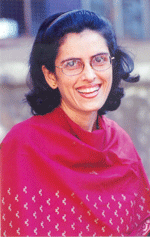 Dilbar Parakh, a human rights lawyer for over 20 years and founder director of Aseema, a Mumbai-based NGO (estb.1995) which offers schooling to 700 underprivileged children in the metropolis, is using her formidable legal acumen and communication skills to spread awareness about child rights, particularly the fundamental right of every child to quality education. “The human rights of children especially the right to education, are routinely violated in India by government, parents and society. Though India is a signatory to the United Nations Convention on the Rights of the Child, and Parliament amended the Constitution in 2002 to make it mandatory for government to provide free and compulsory elementary education to all children in the age group six-14, the neglect of public education is shocking,” says Parakh, a liberal arts graduate of Mumbai’s showpiece St Xavier’s and Government Law colleges.
Dilbar Parakh, a human rights lawyer for over 20 years and founder director of Aseema, a Mumbai-based NGO (estb.1995) which offers schooling to 700 underprivileged children in the metropolis, is using her formidable legal acumen and communication skills to spread awareness about child rights, particularly the fundamental right of every child to quality education. “The human rights of children especially the right to education, are routinely violated in India by government, parents and society. Though India is a signatory to the United Nations Convention on the Rights of the Child, and Parliament amended the Constitution in 2002 to make it mandatory for government to provide free and compulsory elementary education to all children in the age group six-14, the neglect of public education is shocking,” says Parakh, a liberal arts graduate of Mumbai’s showpiece St Xavier’s and Government Law colleges.
After graduating in 1981, Parakh practiced law in the Bombay high court for three years, after which she signed up with the legal aid cell of SNDT Women’s University, where she counselled and represented clients on human rights issues and took paralegal classes for social workers. In 1988, she was awarded a fellowship by the International Human Rights Internship Programme, Washington, to work with the Union for Civil Liberties in Thailand. After two years in Bangkok she accepted a new assignment as legal officer (Asia and the Pacific) of the International Commission of Jurists, Geneva, Switzerland. In 1995 she returned to Mumbai where together with Snehal Paranjpe, a well-known lawyer and Neela Kapadia, a documentary film-maker, she promoted Aseema.
Currently Aseema, which employs 60 full-time staff apart from 30 volunteers, runs a Centre for Underprivileged Children which provides free school education to 700 children, and has also adopted two municipal schools in Mumbai, which the NGO/trust intends to transform into model, showpiece government primary schools.
“Public-private partnerships, built on co-operation and trust, can make a big difference to children studying in government schools. This is the only real option for reforming and upgrading government schools, most of which are in pitiful condition. The national interest demands that NGOs and private schools come forward to take responsibility for improving learning outcomes and infrastructure in public schools,” says Parakh.
Though largely financed by public donations and grants, Aseema raises some of its funds through sale of products designed and crafted by children enrolled in its centres. On the drawing board are plans to promote an education centre for tribal children in Igatpuri in Nasik district (140 km from Mumbai). A 14 acre plot has already been purchased and construction work has begun. “Initially the centre will offer utilitarian vocational training to about 150 tribal children. Aseema is keen on promoting primary schools in rural and tribal areas under the PPP model. Our only condition is that we must be given full academic and operational control to ensure the children receive high quality education,” says Parakh.
Way to go!
Ronita Torcato (Mumbai)